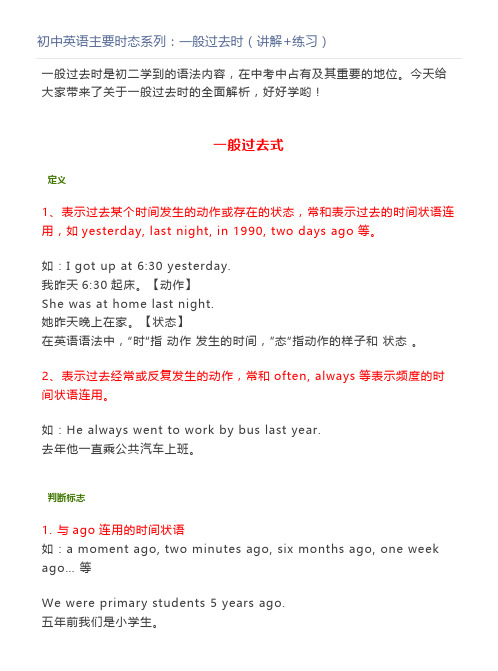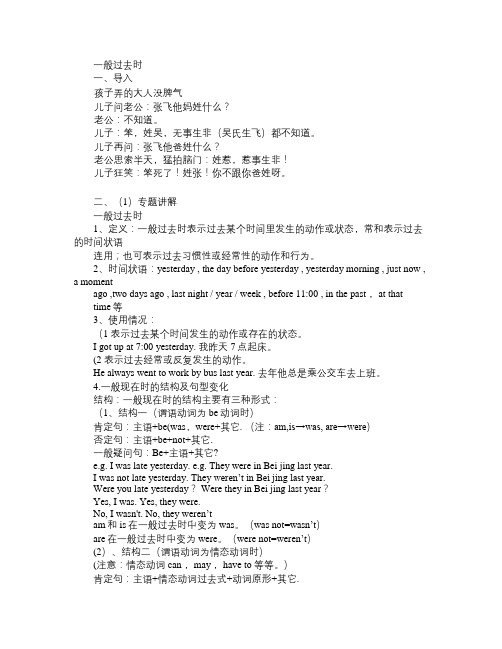初中英语 一般过去时讲解(简单有趣)
初中英语主要时态系列:一般过去时(讲解+练习)

初中英语主要时态系列:一般过去时(讲解+练习)一般过去时是初二学到的语法内容,在中考中占有及其重要的地位。
今天给大家带来了关于一般过去时的全面解析,好好学哟!一般过去式定义1、表示过去某个时间发生的动作或存在的状态,常和表示过去的时间状语连用,如yesterday, last night, in 1990, two days ago等。
如:I got up at 6:30 yesterday.我昨天6:30起床。
【动作】She was at home last night.她昨天晚上在家。
【状态】在英语语法中,“时“指动作发生的时间,”态“指动作的样子和状态。
2、表示过去经常或反复发生的动作,常和often, always等表示频度的时间状语连用。
如:He always went to work by bus last year.去年他一直乘公共汽车上班。
判断标志1. 与ago连用的时间状语如:a moment ago, two minutes ago, six months ago, one week ago… 等We were primary students 5 years ago.五年前我们是小学生。
2. 与last 连用的时间状语last week, last year, last month, last day…He suddenly fell ill last night.他昨晚突然病倒了。
3. 与 yesterday 连用的时间状语yesterday morning, yesterday morning …We weren\'t late yesterday. 我们昨天没迟到.※the day befo re yesterday 昨天4. 与 one 连用的时间状语one morning 某个早上, one evening 某个夜晚5. 与that连用的时间状语that day, that morning, that year…6. 其他时间状语just now 刚刚 in the old days 在过去in 1980 at that time在那时构成含有be动词的一般过去时的主结构:主语+was/were+表语1、肯定句:主语+was/were+表语。
初中英语七年级一般过去时讲解

初一一般过去时讲解一般过去时:一、一般过去时的构成:主语+谓语(动词过去式)+句子其他成分;主语+was/were+形容词/名词/介词短语+过去时间;否定形式①was/were+not;①在行为动词前加didn't,同时还原行为动词;一般疑问句Did+主语+do+其他注意:这里的-ing形式叫做现在分词二、一般过去时句型变化:1、肯定式:主语+谓语(动词过去式)+句子其他成分;主语+was/were+形容词/名词/介词短语+过去时间如:They played computer games together. 他们一起打游戏来着。
I was happy when last week. 上周我很开心。
2、否定式:否定形式①was/were+not;②在行为动词前加didn't,同时还原行为动词;如:They weren't in Paris last year. 他们去年不在巴黎。
I didn’t know that. 我不知道那件事。
3、一般疑问句Did+主语+do+其他。
如:Did you do your homework? 你做作业了吗?4、特殊疑问句式:特殊疑问句结构:特殊疑问词+一般疑问句?现在进行时的特殊疑问句结构:①特殊疑问词+did+主语+do(+其他成分)?②特殊疑问词+was/were+主语+do(+其他成分)?eg:1、What did you do?你们干什么来着?We played basketball.我们打篮球来着。
2、Where were your parents last year?你父母去年在哪里?They were in Tokyo.他们在东京。
注1:1、be动词在现在进行时里算作“助动词”,翻译现在进行时的时候,be不能解释为“是”,否则不通顺。
它只是和现在分词搭配构成“进行时”。
2、变一般疑问句时,形成“一问一答”的关系,要注意第一人称和第二人称相互交换。
初中英语知识点总结一般过去时

初中英语知识点总结一般过去时一、一般过去时的用法:一般过去时表示过去发生或完成的动作、存在的状态或做过的事情。
1.表示过去一些时间发生的动作或存在的状态:- I played soccer yesterday.(我昨天踢足球。
)- He lived in Beijing when he was young.(他年轻时住在北京。
)2.表示过去的习惯性动作或经常发生的动作:- When I was a child, I always went to bed early.(我小的时候总是早睡。
)3.表示过去的客观事实或真理:- The dinosaurs died out millions of years ago.(恐龙在几百万年前灭绝了。
)- She didn't know the answer to the question.(她不知道问题的答案。
)4.表示过去的心理活动、愿望或打算等:- I wanted to be a doctor when I was young.(我年轻时想做一名医生。
)- He hoped to go to the park with his friends.(他希望和朋友去公园。
)二、一般过去时的构成:1.肯定句式:主语+动词的过去式+其他成分- I played basketball last week.- She lived in London for three years.- They watched a movie at the cinema yesterday.2.否定句式:主语 + did not / didn't + 动词原形 + 其他成分- I didn't play basketball last week.- She didn't live in London for three years.- They didn't watch a movie at the cinema yesterday.3.疑问句式:Did + 主语 + 动词原形 + 其他成分?- Did you play basketball last week?- Did she live in London for three years?- Did they watch a movie at the cinema yesterday?三、一般过去时的特殊情况:1.动词过去式的构成规则:a) 一般情况下,动词的过去式在词尾加上-ed:walk - walked(走)talk - talked(说话)play - played(玩)b)以字母e结尾的动词,在词尾只加-d:dance - danced(跳舞)c) 以辅音字母+y结尾的动词,将y变为i,再加-ed:study - studied(学习)d) 以重读闭音节结尾,末尾只有一个辅音字母的动词,双写这个辅音字母,再加-ed:stop - stopped(停止)plan - planned(计划)2.部分动词的过去式不规则,需要记忆:be - was / were(是)have - had(有)go - went(去)do - did(做)write - wrote(写)see - saw(看见)eat - ate(吃)drink - drank(喝)take - took(拿)四、表示一般过去时的时间状语:1.表示过去一些时间的状语:yesterday(昨天)last week(上星期)two days ago(两天前)2.表示过去的时间段的状语:when I was young(我年轻时)in my childhood(在我童年时)in the past(在过去)3.表示过去曾经做过的动作的状语:once(一次)五、注意事项:1. 一般过去时的句子中,谓语动词要用过去式,但be动词有时会用was或were。
初中英语一般过去时语法讲解

III.一般过去时1.一般过去时表示过去某个时间里发生的动作或状态;过去习惯性、经常性的动作、行为;过去主语所具备的能力和性格。
2.一般过去时,表示过去某个时间里发生的非持续性动作或存在的状态,也表示经常或反复发生的动作。
3.动词的变化1).直接加ed:work——worked look——looked talked visited2).以不发音e结尾的单词,直接加d:live ——lived hope——hoped use——used arrived3).以辅音字母+y结尾的,变y为i加ed:study——studied carry——carried worry——worried4).以重读闭音节结尾的,双写最后的辅音字母+ed:stop——stopped plan——plannedShop--shopped读音:清辅音后读/t/,浊辅音读/d/,在/t/和/d/后读/id/.5). 不规则变化的动词过去式:have---had are---were get---got say---said feel---felt do/does---did is---wasgo---wentdrink--drank eat--ate bring----brought think----thought buy----bought catch---- caught teach ---- taught sit----sat wear----wore cut----cut sweep----swept sleep——slept become----became4.常跟过去时间状语连用yesterday (morning,afternoon,evening)the day before yesterdaylast night (week,Sunday,weekend,month,winter,year,century 世纪)a year agothis morning/afternoon/eveningwhen引导的状语从句(动词过去时)just nowthe other day -- a few days ago.at the age of 10 (过去年龄段)in the old daysat that timeat that moment在那一刻例如:Li Ming did the dishes just now.She took the Subway to school this morning.My grandpa was dead last year.二、句法结构基本结构:主语+谓语(动词过去式)+句子其他成分;主语+was/were+形容词/名词/介词短语+过去时间;否定形式①was/were+not;②在行为动词前加didn't,同时还原行为动词;一般疑问句Did+主语+do+其他1、肯定形式主语+动词过去式+其他例句:She often came to help us in those days.2、否定形式①was/were+not;②在行为动词前加didn't,同时还原行为动词例句:I didn't know you like coffee.3、一般疑问句①Did+主语+谓语动词原型+其他?②Was\Were+主语+表语?例句:Did +任何人称+do homework?肯定回答:Yes,代词+did.No,代词+didn’t三、口诀一般过去时并不难,过去动作、状态记心间。
初二英语 时态讲解 一般过去时

一般过去时一、导入孩子弄的大人没脾气儿子问老公:张飞他妈姓什么?老公:不知道。
儿子:笨,姓吴,无事生非(吴氏生飞)都不知道。
儿子再问:张飞他爸姓什么?老公思索半天,猛拍脑门:姓惹,惹事生非!儿子狂笑:笨死了!姓张!你不跟你爸姓呀。
二、(1)专题讲解一般过去时1、定义:一般过去时表示过去某个时间里发生的动作或状态,常和表示过去的时间状语连用;也可表示过去习惯性或经常性的动作和行为。
2、时间状语:yesterday , the day before yesterday , yesterday morning , just now ,a momentago ,two days ago , last night / year / week , before 11:00 , in the past ,at thattime等3、使用情况:(1 表示过去某个时间发生的动作或存在的状态。
I got up at 7:00 yesterday. 我昨天7点起床。
(2 表示过去经常或反复发生的动作。
He always went to work by bus last year. 去年他总是乘公交车去上班。
4.一般现在时的结构及句型变化结构:一般现在时的结构主要有三种形式:(1、结构一(谓语动词为be动词时)肯定句:主语+be(was,were+其它. (注:am,is→was, are→were)否定句:主语+be+not+其它.一般疑问句:Be+主语+其它?e.g. I was late yesterday. e.g. They were in Bei jing last year.I was not late yesterday. The y weren’t in Bei jing last year.Were you late yesterday? Were they in Bei jing last year?Yes, I was. Yes, they were.No, I wasn't. No, they weren’tam和is在一般过去时中变为was。
初中英语时态之一(一般过去时总结)

一般过去时(simple past tense)表示过去某个时间里发生的非持续性动作或存在的状态,用动词的过去式表示,常和表示过去的时间状语连用,如:yesterday,last night,in 1990,two days ago,before,the age of等。
一般过去时也表示过去经常或反复发生的动作,常和often,always等表示频率的时间状语连用。
表示过去习惯性、经常性的动作、行为;过去主语所具备的能力和性格。
一般过去时不需考虑第三人称单数(简称三单)的变化。
句法结构肯定形式主语+动词过去式+其他例句:She often came to help us in those days.否定形式一般疑问句①Did+主语+谓语动词原型+其他?②②Was\Were+主语+表语?例句:Did I do homework?需要注意Be 动词、情态动词、实意动词的变化1.Be 动词的一般过去时态.在没有实义动词的句子中使用be动词,am is 的过去式为was; are的过去式为were.构成:肯定句:主语+was (were) +表语如:I was late yesterday. (昨天我迟到了。
)否定句:主语+was (were) +not+表语如:We weren't late yesterday. (我们昨天没有迟到)【注意】:当句中含有系动词was,were时,可直接在其后加not构成否定句。
如:I was on the Interntwhen you called me.当你打电话给我时,我在上网。
→ :I was not/wasn't on the Internt when you called me .当你打电话给我时,我不在上网。
疑问句:Was (Were) +主语+表语当谓语动词提前并直接或间接表达注意时态特殊疑问句:特殊疑问词+was (were) +主语+表语2.实义动词的一般过去时态肯定句要使用动词的过去式,否定句和疑问句要使用助动词do和does 的过去式did.否定句:主语+didn't +动词原形+宾语疑问句:Did +主语+动词原形+宾语3.助动词和情态动词过去式如下:shall―should(将要)用于第一人称单数will―would(将要)用于所有人称can—could(能,会)may―might(可以)must―must (必须)have to―had to(不得不)助动词和情态动词的过去时态要使用他们的过去式,后面的动词还使用原形。
英语一般过去时技巧(很有用)及练习题及解析

英语一般过去时技巧(很有用)及练习题及解析一、初中英语一般过去时1.He to play sports, but now he is interested in soccer and volleyball.A. doesn't useB. wasn't usedC. didn't useD. didn't used【答案】 C【解析】【分析】句意:他______做运动,但是现在他对足球和排球很感兴趣。
根据句意和选项可知此题考查一般过去时态的否定句式didn't+动词原形,故选C。
【点评】此题考查一般过去时态的否定句式,平时应多归纳总结各种时态,语态和句式的结构及用法。
2.— Where did you go last weekend?— I to the Great Wall.A. goB. wentC. will goD. have gone【答案】B【解析】【分析】句意:——上个周末你去哪里了?——我去长城了。
A,go一般现在时。
B,went一般过去时C,will go一般将来时。
D,have gone现在完成时。
据时间状语last weekend可知此处用一般过去时,故用动词的过去式went。
故选B。
【点评】本题考查一般过去时。
以及go、went、will go、have gone四种事态的用法和区别。
3.— Are you a basketball player in your school ?— Yes. I ______________ the team 3 years ago. I ______________ in it for 3 years.A. joined; wasB. was joined; amC. have joined; have beenD. joined; have been【答案】 D【解析】【分析】句意:——你是你们学校的篮球运动员吗?——是的,三年前我加入了这个团队,我在里面呆了3年。
初中英语一般过去时讲解练习及答案

一、一般过去时的定义一般过去时表示过去某一时候或某一段时间所发生了的事情或存在的状态。
常与过去时间yesterday, this morning, just now, a moment ago, in May, last night / year / week, once upon a time, the other day, before …, when – clause, in the past连用。
如:What did you do yesterday 昨天你干了什么I met Lin Tao this morning. 今天上午我会到了林涛。
I was there a moment ago. 刚才我在那儿二、用法说明1表示在过去某个时间所发生的动作或所处的状态。
常与yesterday, last week, in 1989, just now, a moment ago, the other day等连用。
如:He was here just now. 他刚才还在这里。
;What did you do yesterday 你昨天做了什么事2在过去一段时间内的经常性或习惯性动作。
如:We often played together when we were children. 我们小时候常在一起玩。
注:表示过去经常发生的动作还可用used to 和would。
如:He used to smoke a lot, but he doesn’t now. 他过去经常抽烟,但现在不抽了。
Whenever we were in trouble, he would help us. 每当我们遇到困难,他都会帮助我们。
3表示主语过去的特征或性格。
如:At that time she was very good at English. 那时她英语学得很好。
【4用在状语从句中表示过去将来。
如:He said he would wait until they came back.5一般过去时有时可以表示现在,多与want, hope, wonder, think, intend 等动词连用,使语气更委婉。
